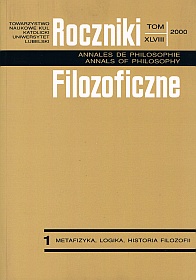Some Remarks on Jan Lukasiewicz’s Conception of Necessity
Abstract
In the logical works of Aristotle modal concepts are taken in some different meanings. At the first period of his modal considerations Lukasiewicz constructs the logical system (so called system L3) in which, according to Lukas iewicz’s intention, these different meanings of modality are covered in (included). He also assumes that modal functors are true-functional and the logical system for such functors has to be many-valued. In this three-valued system L3 the functor of necessity may be characterized as a temporal one. Necessity is applied to sentences about past and present events and to sentences about determined events, while contingency (interpreted as two-sided possibility) to future undetermined events.
In the fifties „the late” Lukasiewicz constructs the four-valued system L4. In this system the matrices for counterparts of classical functors: A, C, E, K, N are defined by multiplying suitable two-valued matrices by theirselves. Thus, the system L4 is classical logic. Axiomatic construction of L4 is based on dividing the set of all propositions into two subsets: asserted and rejected. In consequence, no proposition which is preceded by the functor of necessity can be asserted in this system and iterated modalities are reduced in way which is different from standard one. The philosophical conclussion drawn by Lukasiewicz is that there are no difference between logical (and mathematical) thesis and empirical one with respect to „strenght” of affirmation (which he identifies with modality of proposition).
Copyright (c) 2000 Roczniki Filozoficzne

This work is licensed under a Creative Commons Attribution-NonCommercial-NoDerivatives 4.0 International License.





